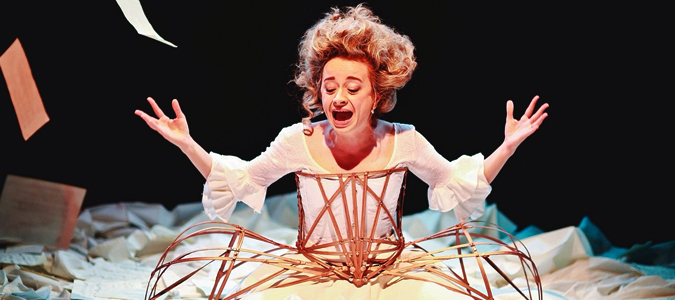

The Other Mozart
Opening Night: June 25, 2014
Closing: July 12, 2014
Theater: HERE Arts Center
The Other Mozart is the true and untold story of Nannerl Mozart, the sister of Amadeus – a prodigy, keyboard virtuoso and composer, who performed throughout Europe with her brother to equal acclaim, but her work and her story faded away, lost to history. Set in and on a sweeping 18-foot dress (designed by Magdalena Dabrowska from the National Theater of Poland), and amidst the Enlightenment and a climate of great social change that still resonates today, the play is based on facts, stories and lines pulled directly from the Mozart family’s humorous and heartbreaking letters. Along with music composed by her famous brother and Marianna Martines (a female composer who inspired Nannerl), original music was written for the play by Nathan Davis and Phyllis Chen (of Lincoln Center’s Mostly Mozart Festival and the International Contemporary Ensemble) using clavichords, music boxes, bells, teacups, and fans.
BUY TICKETSREAD THE REVIEWS:
June 22, 2014
In her one-woman show, Sylvia Milo plays Nannerl Mozart—the older sister of Amadeus—who, according to Milo’s research, was a prodigy like her brother but who was yanked off the European touring circuit at eighteen because she was a female, and destined to be a wife and mother. Milo portrays Nannerl as a kind of early feminist—indignant, frustrated, and continually tweaked by her brother’s success. But she also plays her as upbeat, silly, and maybe even a little ditzy, and this keeps the performance from having much depth or nuance. Still, the set is noteworthy: Milo spends seventy-five minutes on top of a huge white dress, designed by Magdalena Dabrowska, laid out across the stage in an eighteen-foot circle. Inside the folds of the dress are hidden props: a book, a fan, a tiny teacup. Directed by Isaac Byrne.
READ THE REVIEWJune 28, 2014
This summer, HERE hosts The Other Mozart, a solo play created and performed by Sylvia Milo about Amadeus Mozart’s sister Nannerl: “a forgotten genius.” Nannerl Mozart was a talented musician and composer recognized by the courts of Europe and her own brother, but limited by her position in life. Based on research and lines pulled directly from the Mozart family’s letters, this play paints the portrait of a talented and passionate woman who was endlessly held back by circumstances of geography, finance, and gender. The audience is guided through a remarkable woman’s lifetime of struggle and insistence, growing to love her thanks to the care and spirit of Milo’s phenomenal portrayal. Sylvia Milo infuses the evening with charm, emotion, and endless energy. She plays Nannerl Mozart seamlessly from childhood to old age, through periods of optimism, frustration, desperation, and peace. In Milo’s capable hands, Nannerl’s life is epic in it’s smallness and devastating in its depth.
READ THE REVIEWJune 25, 2014
Most people are familiar with the story of Wolfgang Amadeus Mozart, the 18th-century Austrian child prodigy who played before the crowned heads of Europe and went on to compose an astounding canon of work in his relatively short life-span, much of which is still popular today. Far fewer know that in his earliest tours, he took second billing to his older sister, Marianne, who was a virtuoso in her own right. Writer and performer Sylvia Milo illuminates that relatively unknown story with her fascinating and irresistibly intelligent one-woman show, The Other Mozart, now making its New York premiere at HERE Arts Center. Marianne, or Nannerl as her family knew her, was eight when she began taking harpsichord lessons from her Joe Jackson-like father, Leopold. Her three-year-old brother, Wolfgang, joined in the lessons, even though Leopold never allowed Nannerl to play at such a young age. Soon, the two wunderkinder were touring Europe as a double act. Yet once Nannerl was of marrying age, she was kept at home, while Wolfgang continued to perform. She eventually married a lesser nobleman and went on to live a long life in relative obscurity. Meanwhile, her brother flamed out spectacularly, but went on to be known as one of the greatest composers who ever lived.
READ THE REVIEWJune 30, 2014
“Do you know what it says on my gravestone?” the woman asks. “ ‘Maria Anna von Berchtold zu Sonnenburg. The sister of Wolfgang Amadeus Mozart.’ ” Poor Maria Anna. Do you suppose she knows that Wolfie, her little brother, is the reason she piqued our interest? Even in the decidedly feminist solo show The Other Mozart, at Here — written and performed by Sylvia Milo — the story of the thwarted, forgotten sister is inextricable from that of her sibling. As touring prodigies on the 18th-century European concert stage, the Mozart children started out together, whisked from city to city by their ambitious father, Leopold. Eventually, Maria Anna, nicknamed Nannerl, was left at home — not for lack of talent at the keyboard, she tells us, but because her parents worried that continuing to perform in public would damage her marriage prospects. “Music will always be your ornament,” her mother says, and the daughter’s world grows smaller.
READ THE REVIEW





















